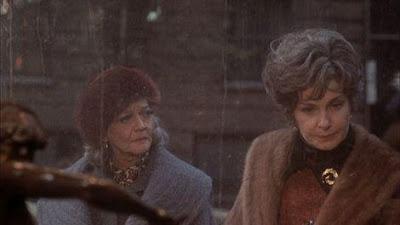Format: Turner Classic Movies on rockin’ flatscreen.

This is going to be tough. Summer Wishes, Winter Dreams is a short movie about a woman’s mid-life crisis. That’s not an immediate deal breaker for me, although I admit that it’s hardly a step in the correct direction. More specifically, this is about the mid-life crisis of the sort of woman whose life appears to be entirely about herself. Her children are grown, her husband is kind of a stranger, and she is suddenly emotionally adrift.
The mid-life crisis genre isn’t necessarily one that I dislike. In fact, there have been movies like Educating Rita and Shirley Valentine that come from almost the same place as Summer Wishes, Winter Dreams that I have liked quite a bit. No, the issue here isn’t the story, but the character. Rita Walden (Joanne Woodward) is an awful, self-absorbed woman who clearly isn’t worth the 87-minute running time of the film.
So let’s get the skinny on Rita here. As mentioned in the previous paragraph, Rita doesn’t really do much. She complains about her daughter (Dori Brenner) and isn’t entirely sure why she married her husband (Martin Balsam). She is estranged from her son mainly because her son has come out as gay and is living in Amsterdam with a man. That wouldn’t be shocking now, but remember this film is from 1973, so having a gay son would be an issue for a lot of people. Rita only seems to be happy when she is reminiscing about her childhood at the family farm. A part of these memories is a farm boy on whom she had a crush. That boy, who was killed in World War II, is a big part of the reason Rita feels like she settled when she married her husband.
The tipping event of the film is the sudden death of Rita’s mother (Sylvia Sidney, who was nominated in a supporting role). The funeral brings out all of the family resentments, including the fate of the family farm, which is still held by Rita and her sister Betty (Tressa Hughes). Betty wants to sell the farm—the money would be useful for everyone. Rita wants to keep the farm, specifically because she wants to give it to her son, even though he wants nothing to do with the family. In an effort to help her through her grief, her husband decides to take her on a trip to Europe. For him, this will be the first time he has been to Europe since his own service in World War II.
It’s here that the film lost me completely. I was mildly invested to this point. I didn’t like Rita much at all, but I was willing to see where this all went by the time the film wrapped up. Rita and her husband Harry battle each other over nothing. And two things happen that made me dislike Rita as much as I have ever disliked any movie character. First, Harry attempts to pay her a compliment. While she is being angry, telling him that he should probably go have an affair, he tells her about seeing a woman around the city who he thought was incredibly beautiful—and it was her. She reacts to this essentially by insulting him. Yeah, it was a corny moment, but it was sweet and an attempt at romance, and Rita immediately kicks him in the crotch.
Second, Rita and Harry go to Bastogne where Harry spent time during the war. For him, this is a return to a place where he saw friends killed and where he fought against a true and terrible evil. Harry relives certain parts of his experience—reliving having killed three German soldiers and spending days in a location where he was forced to look at the bodies of two men that he killed, for instance. This is terrible and traumatic and awful. Rita’s reaction to this is that if her husband is going to be upset about things, maybe they should just leave. She could not be less caring, less sympathetic, or less supportive of anyone.
So let’s talk about the three performances that actually mean something here. I’m not going to take anything away from Joanne Woodward. I didn’t like the character at all, but I can’t take anything away from Woodward’s portrayal. It’s good, even if it’s in service of a character and ultimately a movie I didn’t like. Sylvia Sidney is like more here. She’s not in the film for long but she casts a long shadow over much of it. I like Sylvia Sidney in general, and I’m a little staggered that this was her only Oscar nomination in her long career. The world could use more Sylvia Sidney.
The missed nomination here for me was Martin Balsam. He was nominated for a Golden Globe in a supporting role, and I cannot understand why he wasn’t nominated for an Oscar. He sells the entire performance in the last half hour of the film where he is probably as good as he’s ever been, and that’s saying quite a bit for someone whose career was as generally good as his.
So I’m disappointed with this. I don’t see a need to see it again, and I don’t see a reason why anyone should care about Rita Walden.
Why to watch Ginger Snaps: A great addition to the werewolf genre.
Why not to watch: The creature effects at the end don’t hold up.
